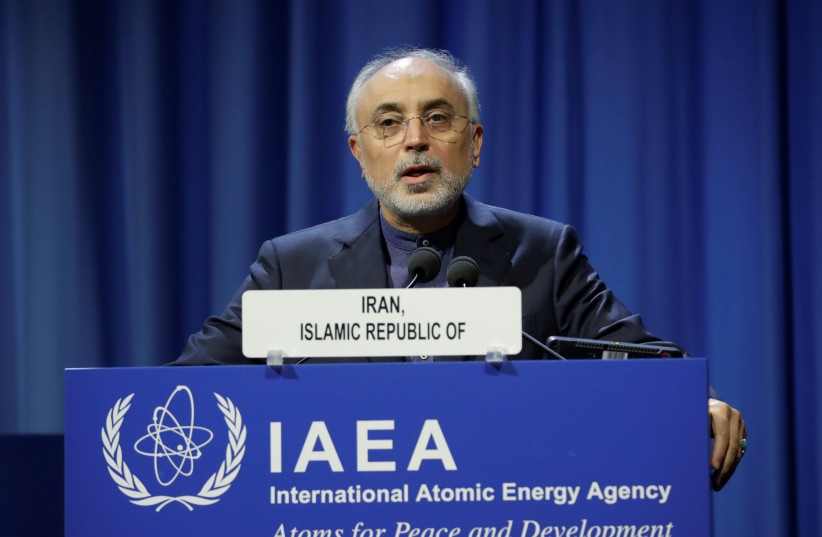by Yonah Jeremy Bob
On Tuesday, the IAEA reported for the first time that Iran has far exceeded the low enriched uranium threshold for a nuclear bomb.
 |
Head of Iran's Atomic Energy Organization Ali-Akbar
Salehi attends the opening of the International Atomic Energy Agency
(IAEA) General Conference at their headquarters in Vienna, Austria
September 16, 2019
(photo credit: REUTERS/LEONHARD FOEGER)
|
The IAEA has finally grown a backbone and yet both Israel and Iran seem to have reached a quiet ceasefire over the nuclear standoff.
On Tuesday, the IAEA reported for the first time that Iran has far exceeded the low enriched uranium threshold for a nuclear bomb.
The threshold is 1,000 kilograms of enriched uranium and the IAEA confirmed that the Islamic Republic has enriched over 1,500 kilograms.In addition, the IAEA’s relatively new chief Rafael Grossi told AFP on Tuesday: "Iran must decide to cooperate in a clearer manner with the agency to give the necessary clarifications.""The fact that we found traces (of uranium) is very important. That means there is the possibility of nuclear activities and material that are not under international supervision and about which we know not the origin or the intent."That worries me," Grossi added.Those are fighting words coming from the normally “no drama” IAEA.
Grossi’s predecessor, Yukiya Amano, did all he could to avoid public conflict with Tehran, no matter what new problematic facts came to his desk.
A Reuters report also said that Grossi would confront the Islamic Republic over multiple undeclared sites that his inspectors were being denied access to.
And yet, both Israel and Iran so far are silent. Neither the prime minister’s office for the foreign ministry indicated they would be issuing an immediate response.
Iranian news outlets merely carried the IAEA’s report about its exceeding the nuclear threshold and the 300 kilogram limit by a magnitude of five with little commentary or counterargument.
For several months, the IAEA has been pressing Iran for explanations about undeclared nuclear material that it found around February 2019. The nuclear material was announced by Prime Minister Benjamin Netanyahu in September 2018 as having been found by the Mossad.
That announcement came after Netanyahu’s April 2018 announcement that the Mossad had appropriated tens of thousands of Iran’s secret nuclear files.
It is those files which, sources close to Mossad Director Yossi Cohen have told the Jerusalem Post, provided a map of undeclared Iranian nuclear sites – some of which now the IAEA is clearly trying to confront Tehran about.
So why is Israel silent?
One reason is it may be embarrassed.
IDF Chief-of-Staff Aviv Kochavi on January 14 said that Iran would not reach this point until January 2021. Ooops.
Former IAEA official Olli Heinonen had predicted a much earlier date in an interview with the Post on January 7 and appears to have been closer to how things played out.
Another reason is that Iran has kept its uranium enrichment around the 4.5% level. As long as the Islamic Republic stays away from the medium 20% level, let alone the 90% weaponization level, there is no immediate crisis.
Prior to the 2015 nuclear deal, Iran had enough low enriched uranium for over 10 nuclear weapons, and the world lived with it since Tehran did not move to much toward higher levels of enrichment.
This may be the same reason that Iran is staying quiet.
With all of its violations and noise, it is actually maintaining a careful conservative strategy which will not unduly provoke Israel (and maybe even the US) into a preemptive strike.
Still, there is no question that Iran may have cut its breakout time from 12 months to 6 months or even less.
Will the IAEA get answers from Iran? Probably not. At the end of the day, the IAEA’s tougher tone is welcome and helpful, but the real keys to breaking the deadlock are in the hands of the EU-3, China and Russia.
The EU-3 recently made it clear that they will not follow through with their threat to snap back full UN global sanctions on Iran as long as Tehran does not move to higher levels of enriched uranium or kick out inspectors.
Incomplete cooperation with the IAEA probably will not lead the EU-3 to pulling the trigger without a new smoking gun that Iran is clandestinely trying to breakout as opposed to clandestinely perform some non-committal off-books nuclear-related tests.
And so the awkward Israeli-Iranian nuclear ceasefire has brought an even awkward moment in which the normally quiet IAEA is being loud and the main players in this story are broadcasting deafening silence.
Yonah Jeremy Bob
Source: https://www.jpost.com/Middle-East/As-Iran-passes-uranium-enrichment-threshold-Israel-stays-quiet-Analysis-619646
Follow Middle East and Terrorism on Twitter
No comments:
Post a Comment